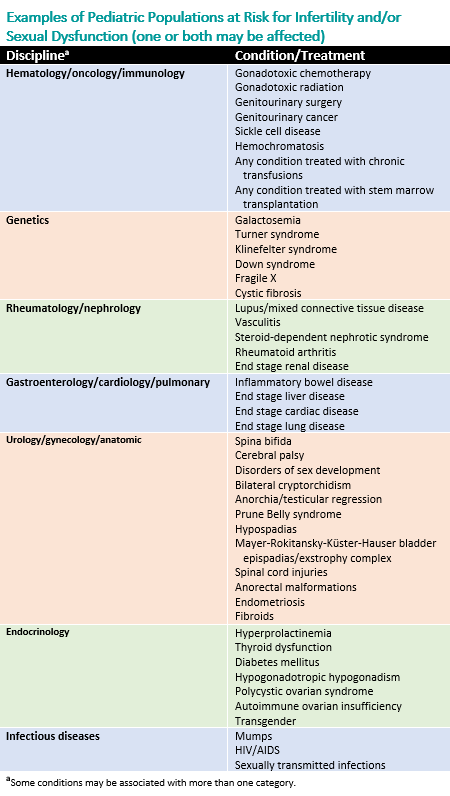Parents in the throes of caring for a sick child, may not have that child's future fertility and sexual function top of mind. However, a number of pediatric conditions and treatments can impact a child's sexual function and ability to have future children of their own.
If you have a child with a chronic health condition, talk with your child's doctors about these issues early so you understand the risks, if any, and options available. Some questions to ask may include:
Does my child's condition pose risks for their future fertility or sexual function?
Will any of the treatments my child is undergoing today affect his or her future fertility or sexual function?
Is there anything we should do now to protect or preserve my child's fertility or sexual function?
What information can I share with my child about future fertility or sexual function?
Tips for Talking with Your Child About Reproductive Health Issues:
The American Academy of Pediatrics (AAP) clinical report,
Counseling in Pediatric Populations at Risk for Infertility and/or Sexual Function Concerns, explains how and why to have ongoing and developmentally appropriate conversations with your child about the potential for future infertility and sexual dysfunction.
Withholding information is not recommended. Studies in women with Turner syndrome, for example, show that a lack of communication about their condition can create tremendous distress later in life when infertility is discovered. The topic of future parenthood can and should be discussed in an age-appropriate manner.
See
Talking to Your Young Child About Sex for additional tips.
Parents of infants/very young children: While fertility preservation options for infants and young children are experimental, it is important to know your options. Educate yourself. New fertility-related technologies and medical and surgical approaches to preserve or improve sexual function may emerge. Talk with your child's health care team and connect with other families who have had similar experiences.
School-aged children: Encourage your child to ask questions. Although detailed
discussions about sex may not be appropriate at this age, children should feel comfortable asking about their bodies at home and at doctors' visits. You might say,
"How are you feeling about your body?" You might also try introducing the topic by saying, "There are many different ways to become a parent and have a family." Check in with your child periodically as he or she grows and matures to see how much he or she understands, since awareness of fertility and sexuality increases with age.
Adolescents and young adults: Like any teenager, your child may struggle with long-term decision making. However, he or she may wonder and worry about the impact of fertility and sexual impairment on future dating and forming romantic relationships. Be aware that your child may be more comfortable discussing these topics in private with his or her doctors―but parents can still be involved in decision making.
Ask your child open-ended questions,
but be specific about fertility, family building, and sexual function/health. These can be awkward conversations. Plain and simple. Try to create a safe and comfortable environment for discussions. Relevant topics may include anatomy, masturbation, erections, nocturnal emissions, sexual fantasies, sexual orientation, orgasms, sensation, and performance.
Do not assume your child is not involved in romantic relationships just because he or she has a chronic condition. Encourage your child to be open and honest with others about his or her illness if it is transmittable or requires daily or ongoing care. How the chronic illness may affect fertility or how it could be passed on to offspring should also be discussed. As your child enters young adulthood, accepting his or her own medical condition will be a key factor in his or her ability to disclose disease status to others.
Emphasize that it is still important to practice safe sex―even if your child is likely to be infertile. While potential infertility may cause distress and anxiety, unplanned pregnancies do happen among those who incorrectly assumed they were infertile. Contraception should be used to prevent unplanned pregnancy and sexually transmitted infections, including human papillomavirus infection.
Provide your with child psychosocial support. Teens with chronic conditions may need the help of a mental health professional to come to terms with their condition. It may take time for them to fully understand how their illness can impact relationships, intimacy, and self-esteem.
See Common Coping Styles of Teens Who Are Chronically Ill or Disabled.
Preserving Your Child's Fertility:
Technology to preserve fertility for future use―known as fertility preservation―is an emerging, evolving field and includes "freezing" sperm and eggs or preserving testicular or ovarian tissue.
Fertility preservation options are currently limited for infants and children who have not yet reached puberty, as well as those with fertility altering conditions such as genetic conditions and differences/disorders of sex development.
More Research is Needed:
Fertility impairment and sexual dysfunction can have a significant effect on quality of life. It can be challenging, at times, to find credible information about these topics; there is little research available on reproductive and sexual health outcomes for many conditions. Some examples include cancer treatments, hematologic or autoimmune conditions requiring bone marrow transplantation, renal and rheumatologic disorders in which alkylators are used, gender affirming hormonal therapy used in the care of transgender youth, differences/disorders of sex development, and other genetic syndromes such as galactosemia.
(See table below).
When possible, the AAP recommends helping children who may have preservation options, in a timely fashion and educating them on their fertility status, options down the road, and about sexual function and reproductive health in general. 
Additional Information: